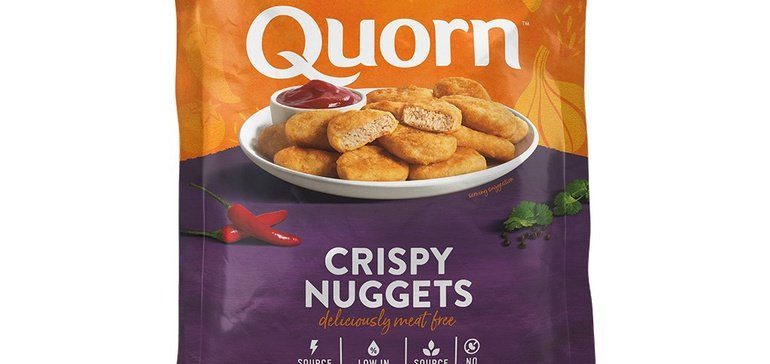Quorn will expand chicken alternative products in US

Dive Brief:
- Quorn sales and distribution will be expanded in the U.S., top Monde Nissin executives told Reuters. Monde Nissin, best known for its Asian noodle and snack brands, also owns the U.K.-based fermented meat analog company. On Tuesday, it had a $1 billion initial public offering on the Philippine Stock Exchange.
- Quorn CEO Marco Bertacca told Bloomberg that the brand’s ambition is to be the world’s top alternative chicken provider. To increase Quorn’s production capacity and presence at U.S. fast food restaurant chains, Monde Nissin will spend nearly 16 billion pesos ($335 million) to expand its presence here.
- Quorn is one of the pioneers in the meat alternative space. The company arose from a British industrialist’s push to find a non-animal source of protein in the 1960s and started selling food in the U.K. in 1985. It arrived in the United States in 2002, and was purchased by Monde Nissin for 550 million pounds ($831 million) in 2015.
Dive Insight:
When Monde Nissin acquired Quorn, the Philippines-based company saw the potential to diversify its portfolio and expand its business to different parts of the world.
And while Quorn has definitely improved Monde Nissin’s portfolio and geographic footprint, it hasn’t done quite as well as the rest of the meat alternative segment. According to Bloomberg, the company has seen construction delays and chiller failures, which slashed inventory and capacity. And while plant-based meat as a whole has grown exponentially in the last three years, the business wire service reported Monde Nissin’s meat alternatives only saw a compound annual growth rate of 5% from 2017 to 2020.
There has been growth in the United States, but not at the level of other plant-based options. In 2019, Quorn told Food Dive its U.S. sales had improved 24% over the previous year. Bloomberg reported that nearly 90% of Quorn sales in 2020 were in the U.K. and Europe. Meanwhile, the U.S. market for meat alternatives is three times as large as the U.K. alone.
Given the consumer appetite for all things meat alternatives, now might be the right time to undertake a massive expansion of Quorn. Research from Boston Consulting Group and Blue Horizon Corporation indicates that animal protein alternatives could comprise 11% of all protein sales by 2035 — maybe more if innovation and regulatory pathways are optimized.
While Quorn isn’t included under the plant-based umbrella because its key ingredient is derived from fungi through fermentation, it is closely related in terms of consumer perception. The pandemic has helped boost sales of plant-based alternatives, which were already rapidly expanding. In 2020, plant-based food sales increased 27% to be worth $7 billion, according to SPINS statistics released by the Good Food Institute and the Plant Based Foods Association. Plant-based alternatives now make up 2.7% of the total U.S. retail packaged meat market.
Products from several other up-and-coming fermentation-based companies are likely to join Quorn’s products in the meat alternatives case soon, though. Fermentation is gaining a foothold in the protein alternatives sector, attracting $435 million in investments in the first nine months of 2020, according to a Good Food Institute report. And while the report looked at a wide variety of companies using fermentation for everything from meat substitutes to ingredients, fermented meat alternatives from companies including Nature’s Fynd and Air Protein are likely to arrive on grocery shelves in the coming years.
While Quorn makes a wide variety of products, Monde Nissin told Bloomberg the company will concentrate on its chicken alternative in the U.S. push. It plans to get its product on fast-food restaurant menus, citing success of a KFC promotion in the U.K. This could be a winning strategy, considering most of the alternative meat items on fast food menus are either hamburgers or sausages. High-profile chicken sandwich launches in U.S. fast food restaurants have driven huge sales increases for restaurants. According to statistics from Edison Trends cited by QSR Magazine, spending on chicken sandwiches increased 420% between January 2019 and December 2020.
Chicken is also getting to be a more popular plant-based protein option in grocery stores, with several product launches and major fundraising for providers in recent months. While Quorn is already there — and has been for years — expansions, innovation and marketing can help it become a top consideration for consumers who are looking for new options.
Source: fooddive.com

